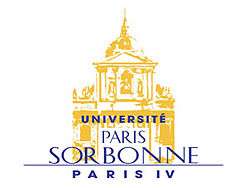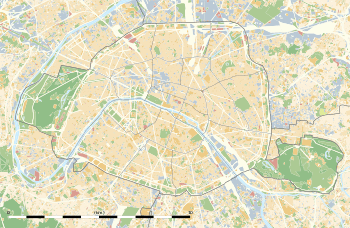Paris-Sorbonne University
|
Université Paris-Sorbonne (Paris IV) | |
 Logo of Paris-Sorbonne University | |
| Type | Public |
|---|---|
| Active | 1 January 1971–31 December 2017 |
| Budget | €118,800,000[1] |
| President | Barthélémy Jobert |
Academic staff | 1,300 |
Administrative staff | 774 |
| Students | 23,505 |
| Undergraduates | 13,900 |
| Postgraduates | 6,916 |
| 2,508 | |
| Location |
Paris, France 48°50′55″N 2°20′34″E / 48.84861°N 2.34278°ECoordinates: 48°50′55″N 2°20′34″E / 48.84861°N 2.34278°E |
| Campus | 12 urban campuses |
| Newspaper | Presses de l'Université Paris-Sorbonne |
| Colours | Indigo, Gold |
| Athletics | Association Sportive de Paris IV |
| Nickname | Paris IV |
| Affiliations | Sorbonne University group |
| Website |
www |
 France Paris | |
Paris-Sorbonne University (also known as Paris IV; French: Université Paris-Sorbonne, Paris IV), was a public research university in Paris, France, from 1971 to 2017.
Paris-Sorbonne University was consistently ranked as France's as well as one of the world's most prominent in the humanities, ranked 13th internationally in 2010, and 17th in 2011, and 2012.[2] It was ranked France's highest reputed institution of higher education in 2012.[3]
Overview
Paris IV was one of the inheritors of the Faculty of Humanities of the University of Paris[1] (also known as the Sorbonne), which ceased to exist following student protests in May 1968. As such, it is a successor of the Sorbonne, whose original focus was humanities.[4] It is a member of the Sorbonne University Group and has been merged into the Sorbonne University on 1 January 2018.[5][6]
The university enrolls about 24,000 students in 20 departments specializing in arts, humanities and languages, divided in 12 campuses in Paris. Seven of the campuses are situated in the historic Latin Quarter, including the historic Sorbonne university building, and three in the Marais, Malesherbes and Clignancourt respectively. Paris-Sorbonne also houses France's prestigious communication and journalism school, CELSA, located in the Parisian suburb of Neuilly-sur-Seine, maintains about 400 international agreements.
As a successor of the faculty of humanities ("faculté des lettres") of the University of Paris, it is a founding member the Sorbonne University group, an alliance with the successor of the faculty of law and economics and of the faculty of science of the University of Paris, Panthéon-Assas University and Pierre-and-Marie-Curie University.[6] This group allows Paris-Sorbonne University students to study sciences, law and political sciences in several Dual Degrees. In 2012, two Graduate Certificates in Law from Panthéon-Assas, the Sorbonne Law School, are accessible for all the students member of the Sorbonne University group.[7]
Alumni
- Mamadou Diouf: Senegalese historian, currently director of the Institute of African Studies at Columbia University
- Ioan Petru Culianu: Romanian historian
- Shahrzad Rafati: Canadian Media Mogul, Tech Entrepreneur and Fashion Icon
See also
References
- 1 2 "Rapport d'évaluation de l'Université Paris-Sorbonne — Paris IV" (PDF). Agence d'évaluation de la recherche et de l'enseignement supérieur. November 2009. p. 7.
- ↑ http://www.topuniversities.com/node/4485/ranking-details/world-university-rankings/2013
- ↑ http://www.timeshighereducation.co.uk/world-university-rankings/2012/reputation-ranking/range/71-80
- ↑ Paris-Sorbonne, L’historique
- ↑ Le Figaro, Le retour de la grande université de Paris
- 1 2 University World News, Merger of elite Paris universities gets the go-ahead
- ↑ Les échos - Un bagage en droit de plus en plus utile